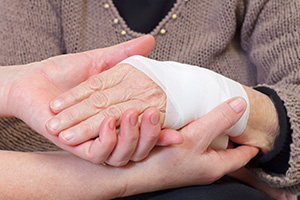 When caring for and healing your wound, it’s essential that you receive proper attention from your healthcare provider and follow a healthy diet. Your healthcare provider makes sure your wound is clean and covered with the correct dressings, but it’s up to you to make sure you’re eating right to promote wound recovery.
When caring for and healing your wound, it’s essential that you receive proper attention from your healthcare provider and follow a healthy diet. Your healthcare provider makes sure your wound is clean and covered with the correct dressings, but it’s up to you to make sure you’re eating right to promote wound recovery.
Here are a few nutritional tips to go by:
Consume the right amount of calories and protein: Make sure you consume the right amount of calories and protein so you have the energy needed to support your daily activities as well as build protein stores and support wound healing.
How much do you need?
A 150-pound person with a wound needs about 102 grams of protein and 2,300 calories daily. Here’s an example of a full-day meal plan:
|
Breakfast |
Lunch |
Snack |
Dinner |
Snack |
|
Pumpkin Pie Oatmeal
Orange Juice: 1 cup |
Turkey Sandwich
Cooked Carrots: ½ cup Grapes: ½ cup 2% Milk: 1 cup |
Vanilla Greek Yogurt: 6 oz Wheat Crackers: 16 crackers Water: 1–2 cups |
Beef Chili
Wheat Dinner Roll: 1 roll Cooked Broccoli: ½ cup Water: 1–2 cups |
Banana with Peanut Butter: 1 banana with 2 T peanut butter 2% Milk: 1 cup |
Drink, drink, drink! Individual water intake needs vary widely and are based on your overall health, physical activity, heat exposure, and physical stress. However, when you have a wound, you may need to drink more since you can lose additional fluids through evaporation, wound drainage, fever, diarrhea or sweating. Remember to drink water throughout the day, before you feel thirsty, and combine fluid intake with meals to stay hydrated. You don’t have to rely on water to fulfill all your fluid needs; other options are milk, coffee, tea, juice, watermelon, oranges, grapefruits, and melons.
Consider adding a medical food that includes zinc, vitamin C, arginine, & citrulline for hard-to-heal wounds: Antioxidants and amino acids accelerate wound healing. Two types of antioxidants are vitamin C and zinc, while common amino acids are arginine and citrulline.
Antioxidant and amino acid food sources:
-
Vitamin C: Oranges, tomatoes, broccoli, cabbage
-
Zinc: Milk, potatoes, bread, fortified cereals
-
Arginine: Meat, fish, dairy, soybeans, peanuts
-
Citrulline: Watermelon
Refer to the article Balanced Nutrition for Advanced Wound Healing to read more about how these nutrients help advanced or hard-to-heal wounds.
If you have a wound, it’s sometimes difficult to consume the full amount of calories, protein and nutrients you need. Consider adding Pro-Stat to your daily menu plan. Pro-Stat contains 15 grams of protein in a delicious, easy-to-drink 1 fl oz shot!
Pro-Stat can also be added to your favorite foods and beverages to give them a nutritional boost. Check out these delicious recipes!
